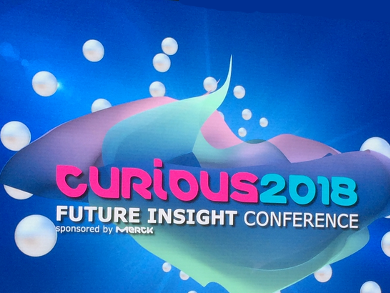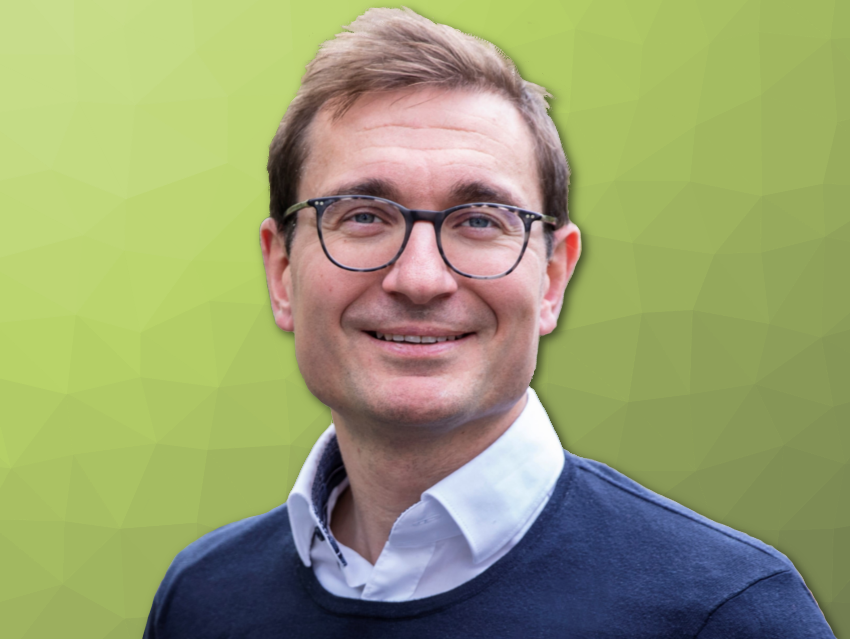Professor Tobias Erb, Director of the Max Planck Institute for Terrestrial Microbiology, Marburg, Germany, has been awarded the Future Insight™ Prize 2022 from Merck KGaA, Darmstadt, Germany. The award was presented at the conference Curious2022 – Future Insight in Darmstadt, on July 13, 2022.
The Future Insight™ Prize, worth EUR 1,000,000, aims to inspire innovative solutions to some of humanity’s biggest problems and make dreams for a better tomorrow in the fields of health, nutrition, and energy a reality. Merck sponsors the award, which honors people who have made significant progress toward achieving this vision through the discovery of breakthrough science or the development of enabling technologies.
Tobias Erb is awarded for his excellent work on capturing CO2 and converting it into new chemical building blocks using biocatalysts. “Tobias Erb has re-engineered photosynthesis to provide humanity with efficient capturing and conversion of carbon dioxide into useful products,” said Belén Garijo, Chair of the Executive Board and CEO of Merck.
He and his team discovered a novel class of CO2-fixing enzymes, enoyl-CoA carboxylases/reductases (ECRs), which are the most efficient CO2-converting biocatalysts known to date. The team also demonstrated that CO2 can be directly converted into pentadecane, a prime component of diesel fuel, as well as into a polyketide that acts as a precursor to an antibiotic drug. Using a “metabolic retrosynthesis” approach, the team designed and realized artificial CO2-fixation pathways that are more efficient than natural photosynthesis. The group is currently focusing on implementing these synthetic pathways in living cells and constructing artificial systems that enable more efficient light-driven capture of CO2 than their natural evolved counterparts.
How Far Can You Push a Boundary?
“The award is both an honor and a motivation for me and the team that indicates we are on the right track, that our science is being recognized and that all the efforts we have put into creating something really new have paid off”, Tobias Erb said when we spoke to him about his award. “When we started thinking about redesigning metabolic pathways and doing synthetic biology and reinventing photosynthesis a few years ago, looking back, it was a totally crazy idea. Of course, we could have failed all along the way. But if you don’t try, you don’t know if it’s going to work.”
He believes that visionary research is first and foremost a mindset. It involves constantly asking yourself how things you read or hear about at conferences can help, not being afraid to pick up or invent new technologies, pushing boundaries, and thinking outside the box.
He said he is fascinated by biology and how nature really works. Nature is capable of converting the greenhouse gas carbon dioxide into something useful, on a planetary scale and at room temperature. We chemists still can’t do that.
Another very interesting thought in this context is how to run a network of different reactions under one condition. Chemist typically would be able to control one or two reactions in one vessel. Tobias Erb has succeeded in controlling 17 reactions in one condition that converts CO2 into a more complex molecule [6]. However, this is still two orders of magnitude behind what living organisms can do. Cells can run up to 1000 different reactions in parallel. That is a goal that fascinates him: to build complex, catalytic networks and to incorporate them into living or artificial cells and further optimize them, eventually transplanting them into fully synthetic organisms.
Academic Career
Tobias J. Erb, born May 9, 1979, in Emmendingen, Germany, studied chemistry and biology at the Albert-Ludwigs-University Freiburg, Germany, and graduated with a diploma in biology and a master’s degree in chemistry in 2005. From 2005 to 2009, he completed his Ph.D. in microbiology at the University of Freiburg and Ohio State University (OSU), Columbus, USA. From 2009 to 2011, Tobias Erb was a postdoctoral researcher at the University of Illinois, Champaign, USA, from 2011 to 2014, he led a junior research group at ETH Zurich, Switzerland, and in 2014, he moved to the Max Planck Institute for Terrestrial Microbiology in Marburg, Germany, as a Max Planck Research Group Leader. Since 2017, Tobias Erb is its director and since 2018 also professor of microbiology at Philipps-Universität Marburg.
Among numerous other awards, Tobias Erb has received the Prix Forcheurs Jean-Marie Lehn in 2021 together with Jean-Christophe Baret, the Otto Bayer Prize in 2018, the Heinz Maier-Leibnitz Prize in 2016, and the Swiss Society of Microbiology’s 2013 Sponsorship Award. He was also on the 2015 American Chemical Society (ACS) C&EN Talented 12 list.
In his research, Tobias Erb seeks to understand and apply the fundamental design principles of metabolism. On the one hand, he and his team study the function and organization of natural metabolism in the context of the living cell. On the other hand, they are using their understanding to build novel, synthetic metabolism in a bottom-up fashion.
Selected Publications
- Marieke Scheffen, Daniel G. Marchal, Thomas Beneyton, Sandra K. Schuller, Melanie Klose, Christoph Diehl, Jessica Lehmann, Pascal Pfister, Martina Carrillo, Hai He, Selçuk Aslan, Niña S. Cortina, Peter Claus, Daniel Bollschweiler, Jean-Christophe Baret, Jan M. Schuller, Jan Zarzycki, Arren Bar-Even, Tobias J. Erb, A new-to-nature carboxylation module to improve natural and synthetic CO2 fixation, Nature Catalysis 2021. https://doi.org/10.1038/s41929-020-00557-y
- Srividhya Sundaram, Christoph Diehl, Niña Socorro Cortina, Jan Bamberger, Nicole Paczia, Tobias J. Erb, A Modular In Vitro Platform for the Production of Terpenes and Polyketides from CO2, Angewandte Chemie International Edition 2021. https://doi.org/10.1002/anie.202102333
- Tarryn E. Miller, Thomas Beneyton, Thomas Schwander, Christoph Diehl, Mathias Girault Richard McLean, Tanguy Chotel Peter Claus, Niña Socorro Cortina, Jean-Christophe Baret, Tobias J. Erb, Light-powered CO2 fixation in a chloroplast mimic with natural and synthetic parts, Science 2020. https://doi.org/10.1126/science.aaz6802
- Lennart Schada von Borzyskowski, Francesca Severi, Karen Krüger, Lucas Hermann, Alexandre Gilardet, Felix Sippel, Bianca Pommerenke, Peter Claus, Niña Socorro Cortina, Timo Glatter, Stefan Zauner, Jan Zarzycki, Bernhard M. Fuchs, Erhard Bremer, Uwe G. Maier, Rudolf I. Amann, Tobias J. Erb, Marine Proteobacteria metabolize glycolate via the β-hydroxyaspartate cycle, Nature 2019. https://doi.org/10.1038/s41586-019-1748-4
- Daniel Moog, Johanna Schmitt, Jana Senger, Jan Zarzycki, Karl-Heinz Rexer, Uwe Linne, Tobias Erb, Uwe G. Maier, Using a marine microalga as a chassis for polyethylene terephthalate (PET) degradation, Microbial Cell Factories 2019. https://doi.org/10.1186/s12934-019-1220-z
- Thomas Schwander, Lennart Schada von Borzyskowski, Simon Burgener, Niña Socorro Cortina, Tobias J. Erb Authors, A synthetic pathway for the fixation of carbon dioxide in vitro, Science 2016. https://doi.org/10.1126/science.aah5237
Also of Interest
 Event Highlight: Stimulate Curiosity
Event Highlight: Stimulate Curiosity
Discussing future visions at Merck’s 350th anniversary with eminent people




